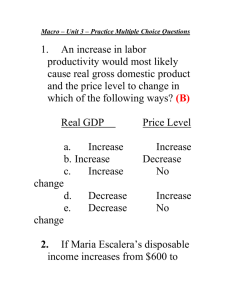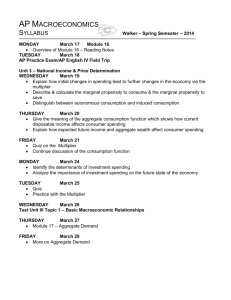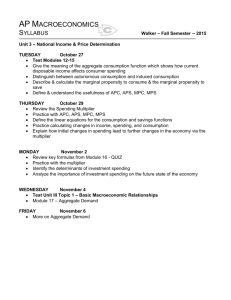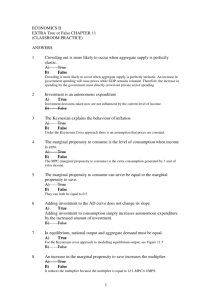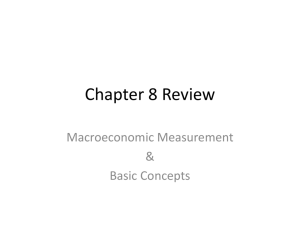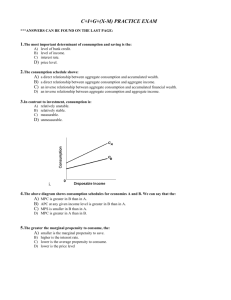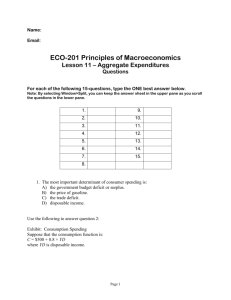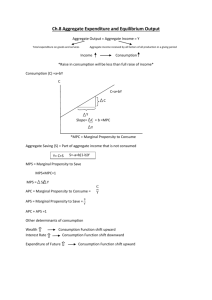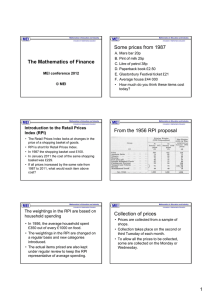Practice Problems
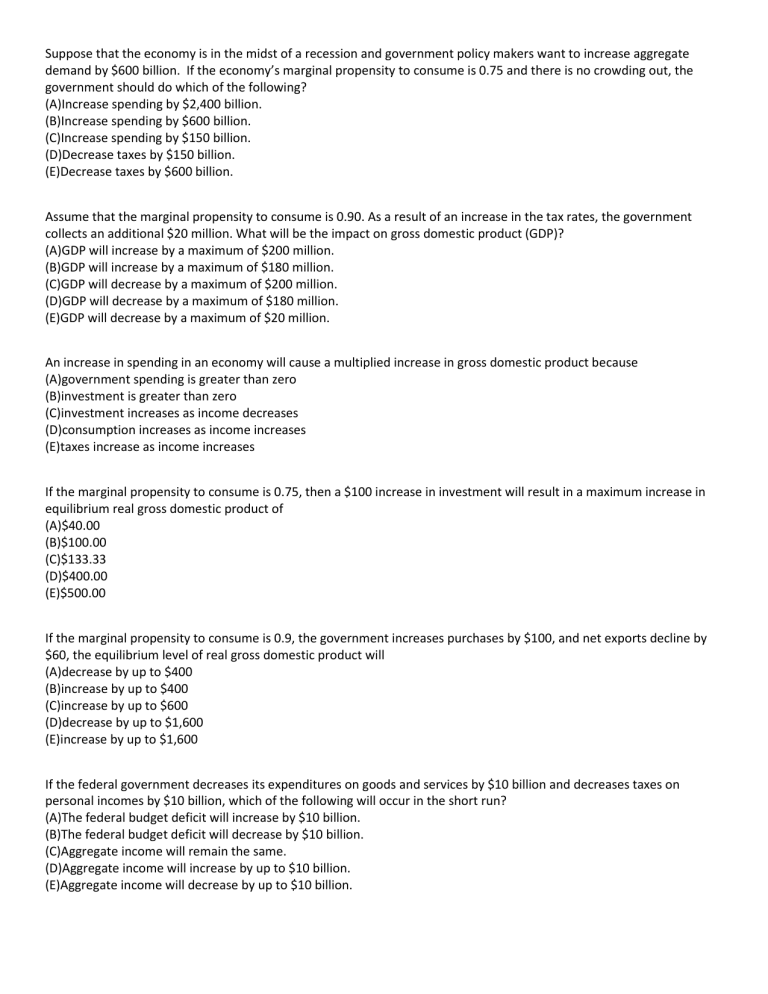
Suppose that the economy is in the midst of a recession and government policy makers want to increase aggregate demand by $600 billion. If the economy’s marginal propensity to consume is 0.75 and there is no crowding out, the government should do which of the following?
(A)Increase spending by $2,400 billion.
(B)Increase spending by $600 billion.
(C)Increase spending by $150 billion.
(D)Decrease taxes by $150 billion.
(E)Decrease taxes by $600 billion.
Assume that the marginal propensity to consume is 0.90. As a result of an increase in the tax rates, the government collects an additional $20 million. What will be the impact on gross domestic product (GDP)?
(A)GDP will increase by a maximum of $200 million.
(B)GDP will increase by a maximum of $180 million.
(C)GDP will decrease by a maximum of $200 million.
(D)GDP will decrease by a maximum of $180 million.
(E)GDP will decrease by a maximum of $20 million.
An increase in spending in an economy will cause a multiplied increase in gross domestic product because
(A)government spending is greater than zero
(B)investment is greater than zero
(C)investment increases as income decreases
(D)consumption increases as income increases
(E)taxes increase as income increases
If the marginal propensity to consume is 0.75, then a $100 increase in investment will result in a maximum increase in equilibrium real gross domestic product of
(A)$40.00
(B)$100.00
(C)$133.33
(D)$400.00
(E)$500.00
If the marginal propensity to consume is 0.9, the government increases purchases by $100, and net exports decline by
$60, the equilibrium level of real gross domestic product will
(A)decrease by up to $400
(B)increase by up to $400
(C)increase by up to $600
(D)decrease by up to $1,600
(E)increase by up to $1,600
If the federal government decreases its expenditures on goods and services by $10 billion and decreases taxes on personal incomes by $10 billion, which of the following will occur in the short run?
(A)The federal budget deficit will increase by $10 billion.
(B)The federal budget deficit will decrease by $10 billion.
(C)Aggregate income will remain the same.
(D)Aggregate income will increase by up to $10 billion.
(E)Aggregate income will decrease by up to $10 billion.
Which of the following best explains the increase in national income that results from equal increases in government spending and taxes?
(A)Consumers do not reduce their spending by the full amount of the tax increase.
(B)The government purchases some goods that consumers would have purchased on their own anyway.
(C)Consumers believe all tax cuts are transitory.
(D)The increase in government spending causes a decrease in investment.
(E)Consumers are aware of tax increases but not of increases in government spending.
Suppose that in an economy with lump-sum taxes and no international trade, autonomous investment spending increases by $2 million. If the marginal propensity to consume is 0.75, equilibrium gross domestic product will change by a maximum of
(A)$0.5 million
(B)$1.5 million
(C)$2.0 million
(D)$8.0 million
(E)$15.0 million
Which of the following changes will have the smallest expansionary effect on aggregate demand in the short run?
(A)An increase in exports of $100
(B)An increase in government spending of $100
(C)A decrease in taxes of $100
(D)A decrease in imports of $100
(E)A decrease in savings of $100
Which of the following can be expected to cause an increase in gross domestic product in the short run?
(A)An increase in the tax rate
(B)An increase in the interest rate
(C)Equal increases in both imports and exports
(D)Equal increases in both taxes and government expenditures
(E)Equal decreases in both investment and government expenditures
Which of the following is true about the marginal propensity to consume?
(A)It is the percentage of total income that is spent on consumption.
(B)It determines the size of the simple spending multiplier.
(C)It increases as incomes increase because increases in income cause people to spend more.
(D)It is the same as the money multiplier.
(E)It is equal to the average propensity to consume for people with low incomes.
In a closed economy with only lump-sum taxation, if the marginal propensity to consume is equal to 0.75, a $70 billion increase in government spending could cause a maximum increase in output of
(A)$52.5 billion
(B)$70 billion
(C)$122.5 billion
(D)$210 billion
(E)$280 billion
An increase in the marginal propensity to consume causes an increase in which of the following?
(A)Marginal propensity to save
(B)Spending multiplier
(C)Savings rate
(D)Exports
(E)Aggregate supply
The value of the spending multiplier decreases when
(A)tax rates are reduced
(B)exports decline
(C)imports decline
(D)government spending increases
(E)the marginal propensity to save increases
If, at full employment, the government wants to increase its spending by $100 billion without increasing inflation in the short run, it must do which of the following?
(A)Raise taxes by more than $100 billion.
(B)Raise taxes by $100 billion.
(C)Raise taxes by less than $100 billion.
(D)Lower taxes by $100 billion.
(E)Lower taxes by less than $100 billion.
